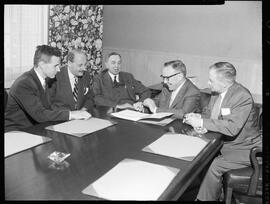Title and statement of responsibility area
Title proper
Waterloo College, Industrial Conference
General material designation
- Graphic material
Parallel title
Other title information
Title statements of responsibility
Title notes
Level of description
File
Reference code
Edition area
Edition statement
Edition statement of responsibility
Class of material specific details area
Statement of scale (cartographic)
Statement of projection (cartographic)
Statement of coordinates (cartographic)
Statement of scale (architectural)
Issuing jurisdiction and denomination (philatelic)
Dates of creation area
Date(s)
Physical description area
Physical description
2 photographs : b&w negatives ; 8 x 10 cm
Publisher's series area
Title proper of publisher's series
Parallel titles of publisher's series
Other title information of publisher's series
Statement of responsibility relating to publisher's series
Numbering within publisher's series
Note on publisher's series
Archival description area
Name of creator
Biographical history
The Kitchener-Waterloo Record began with the publication of the Daily News of Berlin on February 9, 1878 and was the first daily paper in the area. It was published by Peter Moyer. Over the years it had several names and publishers: in January of 1897 it was purchased by the German Printing and Publishing Company and was amalgamated with that company's Berlin Daily Record to become the Berlin News Record, and later still the News Record, all published by William (Ben) V. Uttley. In 1918 the publishers of the German-language paper the Berliner Journal, William D. Euler (later Senator for North Waterloo) and William J. Motz, purchased the News Record and changed the name to the Kitchener Daily Record. On July 17, 1922 the Record absorbed the other daily, the Daily Telegraph. With that event, the original three daily papers (the News Record, the Berlin Daily Record, and the Daily Telegraph) became one.
The Berliner Journal began in December 29, 1859 by Frederick Rittinger and John Motz, and was located on Queen Street south, Kitchener. Motz remained editor until his death in 1899, at which time his son William acquired his father's interest. When Rittinger died in 1915 his share was acquired by William D. Euler. The weekly Journal ended on May 10, 1924. The Record’s first staff photographer was Harry Huehnergard, who worked for the paper for 49 years before retiring in 1986 as Manager of the Photographic Department.
In 1948 the Kitchener Daily Record was re-named the Kitchener-Waterloo Record, which name it retained until 1994, when it became simply The Record. In 1928 the paper moved from its home at 49 King Street west to a new building at 30 Queen Street north where it was to stay for 44 years until moving in May 1973 to 225 Fairway Road. When William J. Motz died in 1946 his son John E. Motz took over as publisher. The by-then Senator Euler sold his interest to Southam Press in 1953. John E. Motz died in 1975 and the Motz Family continued to own a controlling interest in the paper until 1990, when it was sold to Southam. In 1998, The Record was sold to Sun Media Corporation, and then in March 1999, to Torstar Corporation. In January 2005, the paper moved its offices to Market Square on King Street east in Kitchener's downtown core, and on March 11, 2008, the name was changed to the Waterloo Region Record.
Custodial history
Scope and content
Notes area
Physical condition
Immediate source of acquisition
Arrangement
Language of material
Script of material
Location of originals
Availability of other formats
Envelope scanned as TIF files June 2022.
Added to Waterloo Digital Library.
See clipping in File 1958-1in University of Waterloo Archives Vertical files collection.
Restrictions on access
Terms governing use, reproduction, and publication
Public Domain
Finding aids
Associated materials
Accruals
General note
Photo missing from envelope appeared on Page 3 of the May 7, 1958 edition of the newspaper as part of the article: "Would Be Wasted: Brainpower Salvaged By Course, 250 Told".
General note
Photo caption from published version of missing photo [no suitable substitute] "INDUSTRIALISTS CONFER - Canadian industrialists today received information on Waterloo College Associate Faculties' co-operative engineering course. Shown are (left to right) Prof. J.A. Cowan, faculty; C.A. Pollock, board of governors; Ralph Hackbusch, Toronto, president of Hackbusch Electronics; Sir Robert Watson-Watt of Thornhill; P.V. Hilborn of the board of governors; and Henry Barnett, director of planning and development."
General note
People (left to right) in 58-12179_001 based on newspaper caption: J.A. Cowan, C.A. Pollock, P.V. Hilborn, Robert Watson-Watt and Henry Barnett.
General note
58-12179_002 appeared on Page 3 of the Thursday, May 8, 1958 edition of the newspaper as part of the article: "Give Colleges Cash, Then Leave Them Alone, Industrialists Told".
General note
Photo caption from published version of 58-12179_002: "PANEL PARTICIPATION - Taking part in a panel discussion yesterday during an industrial conference at Waterloo College were (left to right) A. S. Barber of the college staff; Gordon Henderson of Sarnia; Joseph McCulley warden of Hart House, University of Toronto; Dr. R.G. Stanton and Dr. T.L. Batke, both of the staff."
General note
58-12179_001 appeared on page 44 of Ken McLaughlin's Waterloo : The Unconventional Founding of an Unconventional University [G13961] with the caption: "Board members C.A Pollock (2nd from left) and P.R. Hilborn (3rd from left) along with Physics Professor Arthur Cowan at the first meeting of the Industrial Advisory Council. In 1956 Hilborn had been instrumental in introducing C.L. Emery, the principal of the Provincial Institute of Trades in Toronto, to President Hagey at Waterloo College. Out of this meeting grew the commitment to develop the co-operative education program later described by Ira Needles as "The Waterloo Plan.""
Alternative identifier(s)
Standard number area
Standard number
Access points
Subject access points
Place access points
Name access points
- Kitchener-Waterloo Record (Photographer)
- Pollock, Carl Arthur (Subject)
- Stanton, Ralph G. (Subject)
- Batke, Theodore Louis (Subject)


